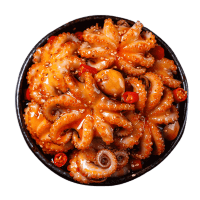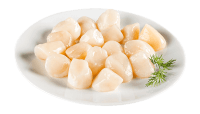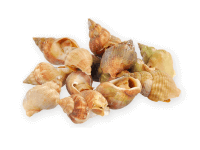Whelk nutrition: calories, carbs, GI, protein, fiber, fats
Mollusks, whelk, unspecified, cooked, moist heat
*all the values are displayed for the amount of 100 grams
Top nutrition facts for Whelk
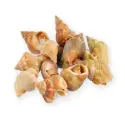
| Calories ⓘ Calories for selected serving | 275 kcal |
| Net Carbs ⓘ Net Carbs = Total Carbohydrates – Fiber – Sugar Alcohols | 16 grams |
| Acidity (Based on PRAL) ⓘ PRAL (Potential renal acid load) is calculated using a formula. On the PRAL scale the higher the positive value, the more is the acidifying effect on the body. The lower the negative value, the higher the alkalinity of the food. 0 is neutral. | 13.3 (acidic) |
Whelk calories (kcal)
| Calories for different serving sizes of whelk | Calories | Weight |
|---|---|---|
| Calories in 100 grams | 275 | |
| Calories in 3 oz | 234 | 85 g |
| Calories for different varieties of whelk | Calories | Weight |
|---|---|---|
| Mollusks, whelk, unspecified, cooked, moist heat (this food) | 275 | 100 g |
| Whelk raw | 137 | 100 g |
Mineral coverage chart
Mineral chart - relative view
Vitamin coverage chart
Vitamin A:
147µg of 900µg
16%
Vitamin E:
0mg of 15mg
0%
Vitamin D:
0µg of 20µg
0%
Vitamin C:
20mg of 90mg
23%
Vitamin B1:
0.15mg of 1mg
12%
Vitamin B2:
0.64mg of 1mg
49%
Vitamin B3:
6mg of 16mg
37%
Vitamin B5:
1.2mg of 5mg
24%
Vitamin B6:
2mg of 1mg
150%
Folate:
33µg of 400µg
8.3%
Vitamin B12:
54µg of 2µg
2268%
Vitamin K:
0µg of 120µg
0%
Vitamin chart - relative view
Macronutrients chart
Protein:
Daily Value: 95%
47.7 g of 50 g
47.7 g (95% of DV )
Fats:
Daily Value: 1%
0.8 g of 65 g
0.8 g (1% of DV )
Carbs:
Daily Value: 5%
15.5 g of 300 g
15.5 g (5% of DV )
Water:
Daily Value: 2%
32 g of 2,000 g
32 g (2% of DV )
Other:
4 g
4 g
Protein quality breakdown
Tryptophan:
1854mg of 280mg
662%
Threonine:
6408mg of 1,050mg
610%
Isoleucine:
4965mg of 1,400mg
355%
Leucine:
11421mg of 2,730mg
418%
Lysine:
8790mg of 2,100mg
419%
Methionine:
3615mg of 1,050mg
344%
Phenylalanine:
4944mg of 1,750mg
283%
Valine:
6225mg of 1,820mg
342%
Histidine:
2931mg of 700mg
419%
Fat type information
Saturated fat:
0.06 g
Monounsaturated fat:
0.06 g
Polyunsaturated fat:
0.05 g
All nutrients for Whelk per 100g
| Nutrient | Value | DV% | In TOP % of foods | Comparison |
| Vitamin A | 49µg | 5% | 35% | |
| Calories | 275kcal | 14% | 33% |
5.9 times more than Orange
|
| Protein | 48g | 114% | 1% |
16.9 times more than Broccoli
|
| Fats | 0.8g | 1% | 77% |
41.6 times less than Cheese
|
| Vitamin C | 6.8mg | 8% | 27% |
7.8 times less than Lemon
|
| Carbs | 16g | 5% | 40% |
1.8 times less than Rice
|
| Net carbs | 16g | N/A | 37% |
3.5 times less than Chocolate
|
| Cholesterol | 130mg | 43% | 8% |
2.9 times less than Egg
|
| Magnesium | 172mg | 41% | 11% |
1.2 times more than Almonds
|
| Calcium | 113mg | 11% | 20% |
1.1 times less than Milk
|
| Potassium | 694mg | 20% | 9% |
4.7 times more than Cucumber
|
| Iron | 10mg | 126% | 6% |
3.9 times more than Beef broiled
|
| Fiber | 0g | 0% | 100% |
N/A
|
| Copper | 2.1mg | 229% | 15% |
14.5 times more than Shiitake
|
| Zinc | 3.3mg | 30% | 28% |
1.9 times less than Beef broiled
|
| Phosphorus | 282mg | 40% | 18% |
1.5 times more than Chicken meat
|
| Sodium | 412mg | 18% | 25% |
1.2 times less than White bread
|
| Selenium | 90µg | 163% | 20% | |
| Manganese | 0.89mg | 39% | 33% | |
| Vitamin B1 | 0.05mg | 4% | 72% |
5.4 times less than Pea raw
|
| Vitamin B2 | 0.21mg | 16% | 42% |
1.6 times more than Avocado
|
| Vitamin B3 | 2mg | 12% | 59% |
4.8 times less than Turkey meat
|
| Vitamin B5 | 0.4mg | 8% | 65% |
2.8 times less than Sunflower seeds
|
| Vitamin B6 | 0.65mg | 50% | 18% |
5.5 times more than Oats
|
| Vitamin B12 | 18µg | 756% | 14% |
25.9 times more than Pork
|
| Folate | 11µg | 3% | 59% |
5.5 times less than Brussels sprouts
|
| Saturated fat | 0.06g | 0% | 84% |
95.1 times less than Beef broiled
|
| Monounsaturated fat | 0.06g | N/A | 84% |
175 times less than Avocado
|
| Polyunsaturated fat | 0.05g | N/A | 90% |
1025.5 times less than Walnut
|
| Tryptophan | 0.62mg | 0% | 42% |
2 times more than Chicken meat
|
| Threonine | 2.1mg | 0% | 42% |
3 times more than Beef broiled
|
| Isoleucine | 1.7mg | 0% | 42% |
1.8 times more than Salmon raw
|
| Leucine | 3.8mg | 0% | 42% |
1.6 times more than Tuna Bluefin
|
| Lysine | 2.9mg | 0% | 43% |
6.5 times more than Tofu
|
| Methionine | 1.2mg | 0% | 41% |
12.6 times more than Quinoa
|
| Phenylalanine | 1.6mg | 0% | 42% |
2.5 times more than Egg
|
| Valine | 2.1mg | 0% | 42% |
Equal to Soybean raw
|
| Histidine | 0.98mg | 0% | 47% |
1.3 times more than Turkey meat
|
| Omega-3 - EPA | 0.01g | N/A | 40% |
86.3 times less than Salmon
|
| Omega-3 - DHA | 0.01g | N/A | 39% |
121.7 times less than Salmon
|
Check out similar food or compare with current
NUTRITION FACTS LABEL
Nutrition Facts
___servings per container
Serving Size ______________
Serving Size ______________
Amount Per 100g
Calories 275
% Daily Value*
1.2%
Total Fat
0.8g
0.28%
Saturated Fat 0.06g
0
Trans Fat
0g
43%
Cholesterol 130mg
18%
Sodium 412mg
5.2%
Total Carbohydrate
16g
0
Dietary Fiber
0g
Total Sugars 0g
Includes ? g Added Sugars
Protein
48g
Vitamin D
0mcg
0
Calcium
113mg
11%
Iron
10mg
126%
Potassium
694mg
20%
*
The % Daily Value (DV) tells you how much a nutrient in a serving of food contributes to a daily diet. 2,000 calories a day is used for general nutrition advice.
Health checks
ⓘ
Dietary cholesterol is not associated with an increased risk of coronary heart disease in healthy individuals. However, dietary cholesterol is common in foods that are high in harmful saturated fats.
Source
Low in Cholesterol
ⓘ
Trans fat consumption increases the risk of cardiovascular disease and mortality by negatively affecting blood lipid levels.
Source
No Trans Fats
ⓘ
Saturated fat intake can raise total cholesterol and LDL (low-density lipoprotein) levels, leading to an increased risk of atherosclerosis. Dietary guidelines recommend limiting saturated fats to under 10% of calories a day.
Source
Low in Saturated Fats
ⓘ
While the consumption of moderate amounts of added sugars is not detrimental to health, an excessive intake can increase the risk of obesity, and therefore, diabetes.
Source
Low in Sugars
Whelk nutrition infographic
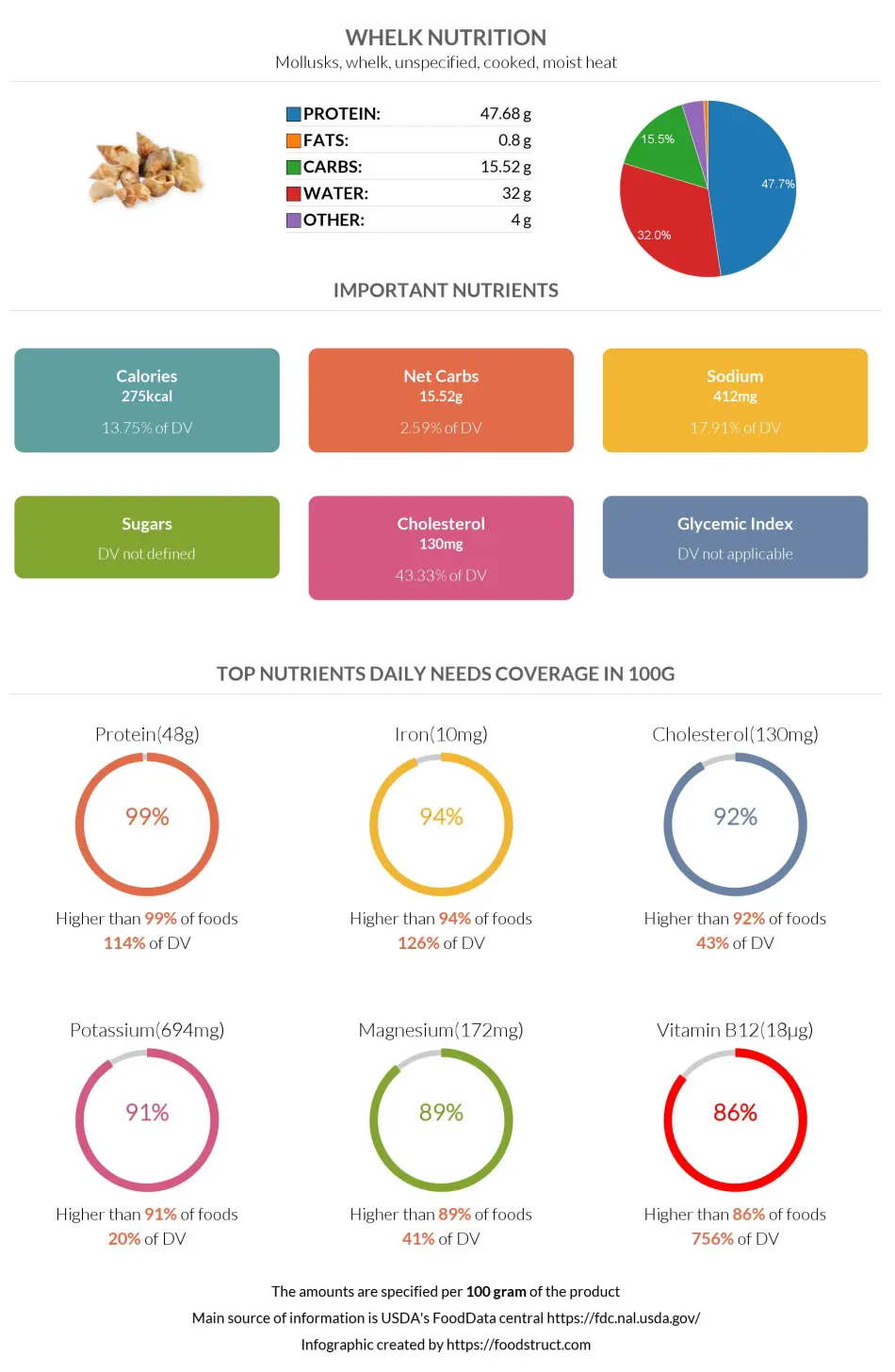
Infographic link
References
All the values for which the sources are not specified explicitly are taken from FDA’s Food Central. The exact link to the food presented on this page can be found below.
